did you play basketball last sunday 2课时
- 格式:ppt
- 大小:514.00 KB
- 文档页数:18
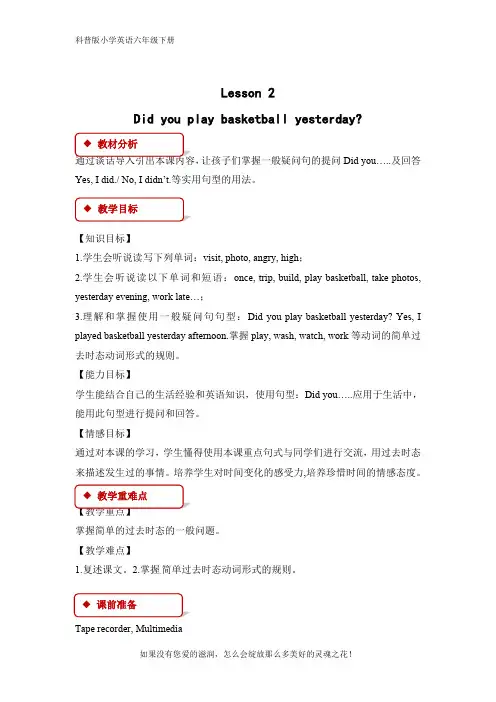
Lesson 2Did you play basketball yesterday?让孩子们掌握一般疑问句的提问Did you…..及回答Yes, I did./ No, I didn’t.等实用句型的用法。
【知识目标】1.学生会听说读写下列单词:visit, photo, angry, high ;2.学生会听说读以下单词和短语:once, trip, build, play basketball, take photos,yesterday evening, work late…;3.理解和掌握使用一般疑问句句型:Did you play basketball yesterday? Yes, I played basketball yesterday afternoon.掌握play, wash, watch, work 等动词的简单过去时态动词形式的规则。
【能力目标】学生能结合自己的生活经验和英语知识,使用句型:Did you…..应用于生活中,能用此句型进行提问和回答。
【情感目标】通过对本课的学习,学生懂得使用本课重点句式与同学们进行交流,用过去时态来描述发生过的事情。
培养学生对时间变化的感受力,培养珍惜时间的情感态度。
掌握简单的过去时态的一般问题。
【教学难点】1.复述课文。
2.掌握简单过去时态动词形式的规则。
Tape recorder, MultimediaStep 1. Greetings and warm-up activities1. Free talk:--- Did you do your homework yesterday?--- Yes, I did. No. I didn’t.--- Was it difficult?2. Learn the new words and phrases :/’vizit/ --- visit--- visit a friend ---to find the meaning in the dialogue;/’fəutəu /--- photo (try to spell phone) --- photos, potatoes, tomatoes --- find out the phrase in the dialogue.3. Learn the dialogue :A. Q: 1. Who’s talking with Lul u?2. Does Tom often play basketball on Sunday afternoons?3. Did Tom play basketball yesterday?4. Did he have a good time?5. Did Tom like photos?B. listen to the sound recording and answer the questions.C. Read the dialogue after the recording.Pay attention the v-ed: did, went, showed, liked (underlining and remembering them).Step 2 Let’s learn.1. 简单问答:Did you play basketball yesterday?did went showed liked 选择一些学生背诵或表演对话。
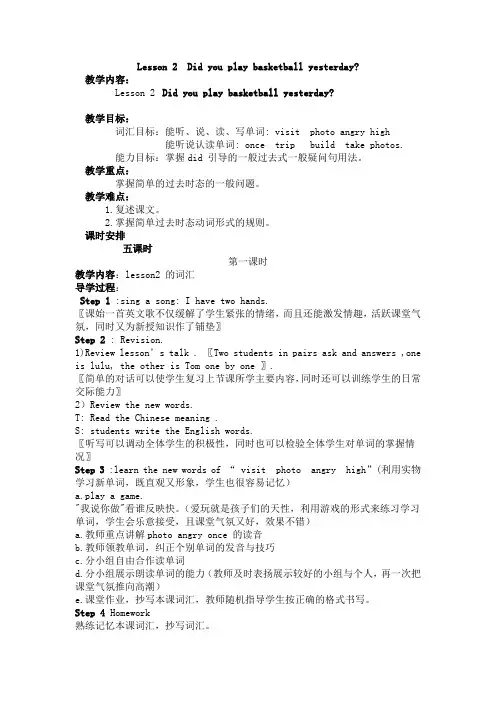
Lesson 2 Did you play basketball yesterday?教学内容:Lesson 2 Did you play basketball yesterday?教学目标:词汇目标:能听、说、读、写单词: visit photo angry high能听说认读单词: once trip build take photos.能力目标:掌握did 引导的一般过去式一般疑问句用法。
教学重点:掌握简单的过去时态的一般问题。
教学难点:1.复述课文。
2.掌握简单过去时态动词形式的规则。
课时安排五课时第一课时教学内容:lesson2 的词汇导学过程:Step 1 :sing a song: I have two hands.〖课始一首英文歌不仅缓解了学生紧张的情绪,而且还能激发情趣,活跃课堂气氛,同时又为新授知识作了铺垫〗Step 2 : Revision.1)Review lesson’s talk . 〖Two students in pairs ask and answers ,one is lulu, the other is Tom one by one 〗.〖简单的对话可以使学生复习上节课所学主要内容,同时还可以训练学生的日常交际能力〗2)Review the new words.T: Read the Chinese meaning .S: students write the English words.〖听写可以调动全体学生的积极性,同时也可以检验全体学生对单词的掌握情况〗Step 3 :learn the new words of “ visit photo angry high”(利用实物学习新单词,既直观又形象,学生也很容易记忆)a.play a game."我说你做"看谁反映快。
(爱玩就是孩子们的天性,利用游戏的形式来练习学习单词,学生会乐意接受,且课堂气氛又好,效果不错)a.教师重点讲解photo angry once 的读音b.教师领教单词,纠正个别单词的发音与技巧c.分小组自由合作读单词d.分小组展示朗读单词的能力(教师及时表扬展示较好的小组与个人,再一次把课堂气氛推向高潮)e.课堂作业,抄写本课词汇,教师随机指导学生按正确的格式书写。
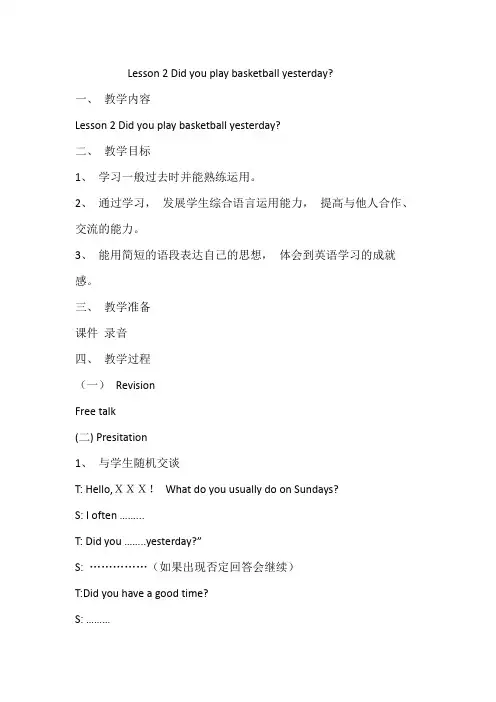
Lesson 2 Did you play basketball yesterday?一、教学内容Lesson 2 Did you play basketball yesterday?二、教学目标1、学习一般过去时并能熟练运用。
2、通过学习,发展学生综合语言运用能力,提高与他人合作、交流的能力。
3、能用简短的语段表达自己的思想,体会到英语学习的成就感。
三、教学准备课件录音四、教学过程(一)RevisionFree talk(二) Presitation1、与学生随机交谈T: Hello,XXX!What do you usually do on Sundays?S: I often ……...T: Did you ……..yesterday?”S: ……………(如果出现否定回答会继续)T:Did you have a good time?S: ………2、出示talk 中图片T: Who are they? What are they talking about? Do you want to know?S: Yes.T: Please listen to the tape carefully.(出示Let’s talk)三、drill1、Listen to the tape2、Read after the tape3、Read together.4、Read byself.5、Retell.四、homework1、读出下列词语的过去式Went did showed likedSaw said was were2、根据课文,填入所缺的单词L: Hello, Tom! What you usually do Sunday afternoons?T: I often basketballL: you basketball yesterday?T. No. I . I to visit a friendL: Did you a good time?T: Yes, I did. My friend likes photosHe me many photosL: Did you the photos?T: Yes, I them very much3、仿照课文写一段对话。
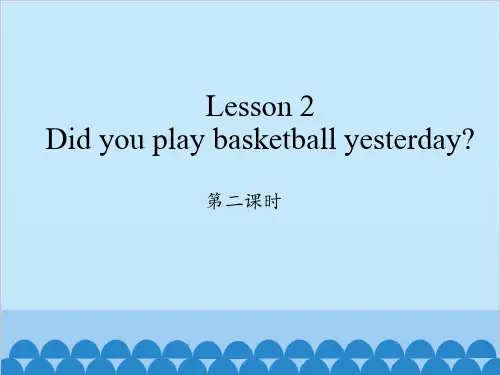
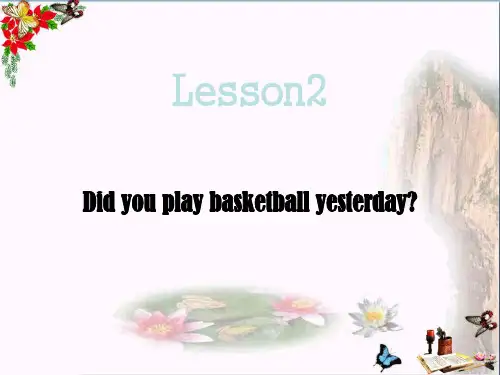
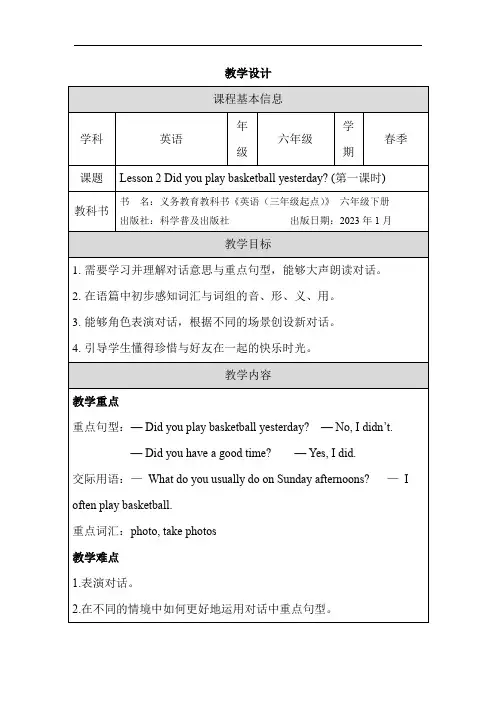

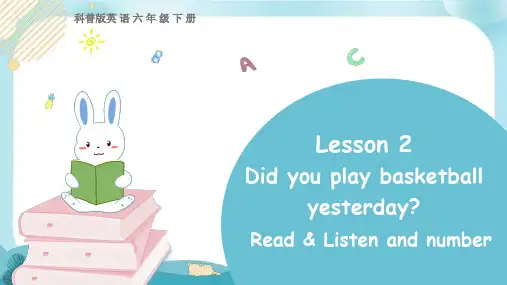
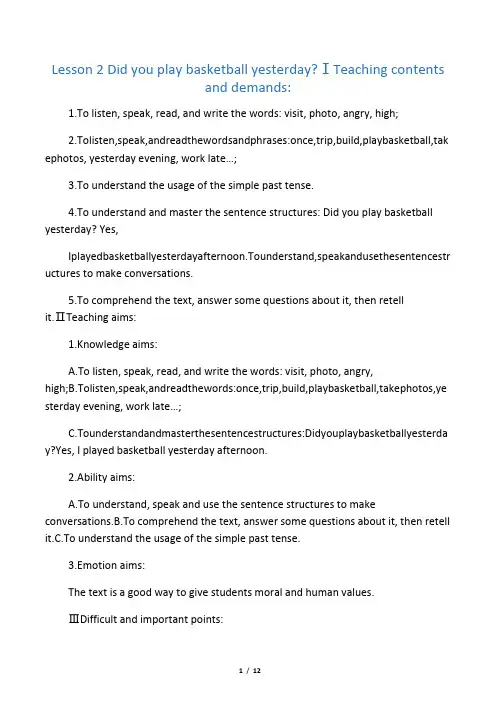
Lesson 2 Did you play basketball yesterday?ⅠTeaching contentsand demands:1.To listen, speak, read, and write the words: visit, photo, angry, high;2.Tolisten,speak,andreadthewordsandphrases:once,trip,build,playbasketball,tak ephotos, yesterday evening, work late…;3.To understand the usage of the simple past tense.4.To understand and master the sentence structures: Did you play basketball yesterday? Yes,Iplayedbasketballyesterdayafternoon.Tounderstand,speakandusethesentencestr uctures to make conversations.5.To comprehend the text, answer some questions about it, then retellit.ⅡTeaching aims:1.Knowledge aims:A.To listen, speak, read, and write the words: visit, photo, angry,high;B.Tolisten,speak,andreadthewords:once,trip,build,playbasketball,takephotos,ye sterday evening, work late…;C.Tounderstandandmasterthesentencestructures:Didyouplaybasketballyesterda y?Yes, I played basketball yesterday afternoon.2.Ability aims:A.To understand, speak and use the sentence structures to make conversations.B.To comprehend the text, answer some questions about it, then retell it.C.To understand the usage of the simple past tense.3.Emotion aims:The text is a good way to give students moral and human values.ⅢDifficult and important points:1.Difficult points:To retell the text.To master the rules of the verbs forms of the simple past tense.2.important points:To master the general questions of the simple past tense.IV Teaching preparation:sound recording( To train the students“ ability of listening andspeaking)TTP(Toexpresstheknowledgetoolsthatcanimageandofferhelptosolvethediffic ultpoints.)V Teaching arrangement:1st: Let“s talk2nd: Let“s learn, Let’s chan t & Match and say3rd: Listen and number & a part of the Read4th: Read, Listen and sayVI Teaching procedures:1st1.Teaching contents:Let“s talk2.Teaching aims:Knowledge aims:A.To listen, speak, read, and write the words: visit, photo(photos, take photos);B.To understand and master the sentence structures: Did you play basketball yesterday?Yes, I played basketball yesterday afternoon.C.To listen and read the dialogue.Ability aims:A. To master the rules of the verbs forms of the simple past tense.(did, went, showed, liked).B. To speak and recite the dialogue and use the scene to make conversations.Emotion aims:Developing the students“ integrated skills in using the language and promoting thestudents“ learning interest.3.Difficult and important points:A.Difficult points: Using the general conversation in this dialogue.B.Important points: Understanding and mastering the dialogue.3.Preparation:CAI, sound recording4.Teaching procedures:Step1: Revision:Free talk:--- Did you do your homework yesterday?---Yes, I did. Mo. I didn’t.--- Was it difficult?…Step2: Presentation:1.Learn the new words and phrases./’vizit/--- visit--- visit a friend ---to find the meaning in the dialogue;/’fəutəu/---photo(trytospellphone)---photos,potatoes,tomatoes---findoutthe phrase in the dialogue.2.Learn the dialogue;A.Q: 1. Who’s talking with Lulu?2. Does Tom often play basketball on Sunday afternoons?3. Did Tom play basketball yesterday?4. Did he have a good time?5. Did Tom like photos?B. listen to the sound recording and answer the questions.C. Read the dialogue after the recording.Pay attention the v-ed: did, went, showed, liked(underlining and remembering them).Step3: Practice:1. Read the dialougue;2.(CAI/Flip charts)To offer key words, pictures, and sound recording, let thestudents to read.3.According to the informations, let the students to retell the text.Step4: Consolidation and extension:1. Act the dialogue.2.Tell your par tner what did you do at 7 o’clockyesterday evening?.Step5: Homework:Act the dialouge in pairs or recite it.Step6: Blackboard-writing:Lesson 2Do you play basketball yesterday?did went showed likedStep 7:Refection:2nd1. Teaching contents:Let“s learn, Let’s chant & Match and say2.Teaching aims:Knowledge aims:A.To understand and master the sentence structures: Did you play basketball yesterday?Yes, I played basketball yesterday afternoon.Ability aims:A. To master the rules of the verbs forms of the simple past tense.B. To use the scene to make conversations.C. To say the chant and do the“match and say”Emotion aims:Developingthestudents“integratedskillsinusingthelanguageandpromotingthestu dents“learning interests.3.Difficult and important points:Difficult points: To master the rules of the verbs forms of the simple past tense.Important points: using the sentence structures to make conversations.4.Preparation:CAI, sound recording5. Teaching procedures:Step1: Revision:A.Choose some students to recite or act the dialogue ;B. To reviewthe simple past tense1、大凡情况下,动词词尾加-ed,如:work ---workedplay---played wanted----wanted act----acted2、以不发音的-e结尾动词,动词词尾加-d,如:live---lived move----moved taste---tastedhope---hoped3、以辅音字母+ y结尾的动词,把-y变为-i再加-ed,如:study---studied copy---copiedcry---cried carry---carried4、以一个辅音字母结尾的重读闭音节动词,双写词尾辅音字母,再加-ed,如:stop ---stopped5、不规则动词的过去式变化规律性不强,须多加记忆。
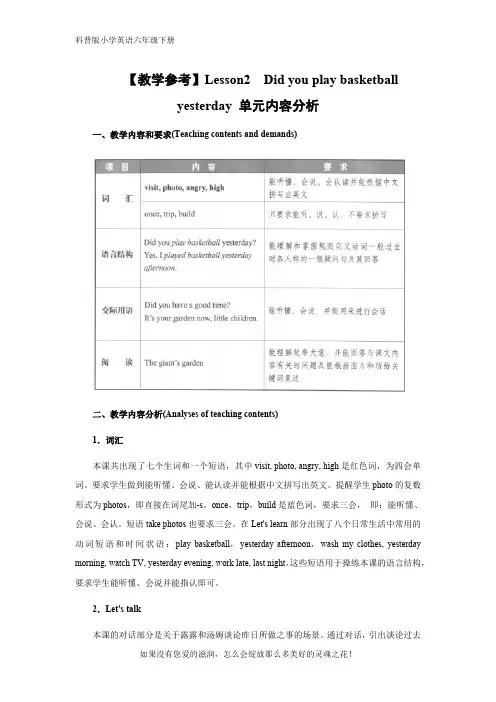
【教学参考】Lesson2 Did you play basketballyesterday 单元内容分析一、教学内容和要求(Teaching contents and demands)二、教学内容分析(Analyses of teaching contents)1.词汇本课共出现了七个生词和一个短语,其中visit, photo, angry, high是红色词,为四会单词。
要求学生做到能听懂、会说、能认读并能根据中文拼写出英文。
提醒学生photo的复数形式为photos,即直接在词尾加-s。
once,trip,build是蓝色词,要求三会,即:能听懂、会说、会认。
短语take photos也要求三会。
在Let's learn部分出现了八个日常生活中常用的动词短语和时间状语:play basketball,yesterday afternoon,wash my clothes, yesterday morning, watch TV, yesterday evening, work late, last night,这些短语用于操练本课的语言结构,要求学生能听懂、会说并能指认即可。
2.Let's talk本课的对话部分是关于露露和汤姆谈论昨日所做之事的场景。
通过对话,引出谈论过去事件的交际用语Did you play basketball yesterday? No,I didn't.1 went to visit a friend.进一步学习一般过去时态,并且以规则变化的动词为主。
3.语言结构在上一册第九课我们学习了含动词be的一般过去时态,本课着重学习含实义动词的一般过去时态。
在一般过去时态中,实义动词要用其过去式形式。
实义动词的过去式有规则变化和不规则变化两种,本课主要学习规则动词的变化。
变化规则如下:1) 一般情况下,在动词原形后直接加-ed。
如:wanted,played。